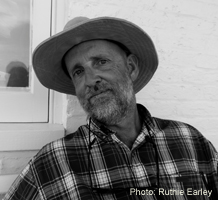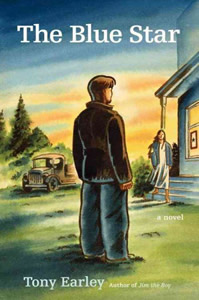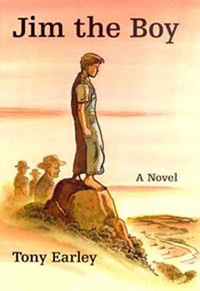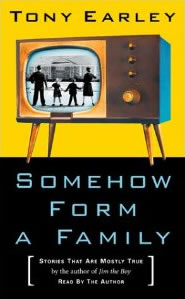In an essay called “Granny’s Bridge,” first published in The New Yorker and later collected in Somehow Form a Family (Algonquin, 2001), Tony Earley tells the story of his grandmother’s ill-fated bus trip in 1953, the only time in her disappointed life that she ever really left Polk County, North Carolina. She intended to retrieve a runaway son who’d lighted out for Florida, but that’s all in the world she knew of his whereabouts.
Years later she tells Earley about her quest, leaving out all the humiliating aspects of the story to focus on the experience of riding across a magnificent Charleston bridge beside an unfathomable ocean. “She did not mention,” he writes, “that she didn’t know where she was going at the time, or that people snickered about that adventure behind her back for years. Instead, she chose to tell me, from what she must have considered an inadequate array of choices, that she had once seen a sight so extraordinary that she had become extraordinary by seeing it. In an alchemy of will, she took a bus, a bridge, and a failed journey and transformed them into the culmination of a life. It wasn’t lying, exactly, but rather burnishing memory until it looked like hope. It was her voice crying out, ‘Here I am! Here I am!’ even as it grew fainter and fainter and finally crossed out of earshot.”
This, besides being simply a beautiful piece of writing and a moving example of empathy, is also a useful metaphor for Tony Earley’s own work. Earley’s closest literary forebears are children’s books: in their luminous, direct, un-ironic use of language, in the way the undeniable darkness of the world is more foreshadowing than plot device, his novels come closer to The Wind in the Willows, Little House on the Prairie, and Charlotte’s Web than to the work of any contemporary author. Jim the Boy (Little, Brown, 2000) and The Blue Star (Little, Brown, 2008), are set in rural, pre-War Appalachia, where the family farm is the reassuring center of the universe, but if that world bears no resemblance to twenty-first-century Nashville, where Tony Earley actually lives, what alchemy of will is better than a fully realized novel for burnishing such hopes of a simpler, kinder human existence and making of them a lasting reality? What better way than a collection of essays to ensure that cries of “Here I am!” are not lost to the winds over the Cooper River Bridge?
 If critics, at least, have anything to say about it, Earley’s work will last. In 1996, on the strength of one story collection—Here We Are in Paradise (Little, Brown, 1994)—and zero novels, Earley found himself on Granta’s list of “20 Best Young American Novelists.” In 1999, The New Yorker named him to its inaugural list of the best young writers in the country. Whenever Earley publishes a book, it invariably lands on best-of-the-year lists all over the media, and nearly two decades after he published his first book, all four of his titles remain in print.
If critics, at least, have anything to say about it, Earley’s work will last. In 1996, on the strength of one story collection—Here We Are in Paradise (Little, Brown, 1994)—and zero novels, Earley found himself on Granta’s list of “20 Best Young American Novelists.” In 1999, The New Yorker named him to its inaugural list of the best young writers in the country. Whenever Earley publishes a book, it invariably lands on best-of-the-year lists all over the media, and nearly two decades after he published his first book, all four of his titles remain in print.
Tony Earley will give a reading at Christian Brothers University in Memphis on March 22. He answered questions from Chapter 16 by email prior to the event.
Chapter 16: Early in your career you earned a lot of attention as a promising young author. Some young writers would find it very encouraging to be the focus so much literary scrutiny; others might find it almost paralyzing. Looking back now from the perspective of middle age, how would you say those early accolades affected you and your writing?
Tony Earley: Thanks for pointing out the middle-aged part. In retrospect the accolades turned out to be a mixed blessing, but nothing that I would give back or trade in. I did unfortunately misuse all the attention to put pressure on myself, but at the same time it suggested, at least to me, that I had arrived at the places I had always wanted to go. Maybe I didn’t get all the way to the top of the mountain, but I got close enough to the summit to get a good look at it. On bad days there’s some comfort in that.
Chapter 16: You have called Jim the Boy “a children’s book for adults,’’ but The Blue Star tackles more complex topics: racism, war, romantic love. At one time, at least, you planned for your next novel to pick up with Jim when he returns from the war. Is that still the plan?
 Earley: I tried writing the next Jim book shortly after The Blue Star came out, but it just wasn’t happening. I have no idea when, or even if, it will. Stories ferment on their own, in some backwater of the brain, in ways that I don’t pretend to understand. I may go back to Aliceville some day, and I may not. Your guess is as good as mine.
Earley: I tried writing the next Jim book shortly after The Blue Star came out, but it just wasn’t happening. I have no idea when, or even if, it will. Stories ferment on their own, in some backwater of the brain, in ways that I don’t pretend to understand. I may go back to Aliceville some day, and I may not. Your guess is as good as mine.
Chapter 16: Last year in The New York Times, Dwight Garner threw down a gauntlet before America’s novelists: “If you and your peers wish to regain a prominent place in the culture, one novel a decade isn’t going to cut it.” You’re a novelist who takes his time between books—any response to this argument?
Earley: I think Dwight has a point. Given what I’ve noticed to be the direct correlation between publishing and prominence, I certainly wish I wrote faster. But as far as cultural prominence for novelist goes, I think that ship has already sailed. When I look at the literary landscape today, I don’t see a Norman Mailer wandering around. I think Jonathan Franzen has applied for the job, but as far as I can tell the position remains unfilled. I mean, if one were able to compare how many people have watched Dancing with the Stars with the number of people who’ve read The Corrections, the answer wouldn’t be pretty. J.K. Rowling is probably the only novelist out there who could lay out Kim Kardashian in a fair fight. That’s just the world we live in now.
Chapter 16: Probably no one questions whether the South still produces great writers, but the question of whether the South can still claim a distinctive regional identity, and particularly whether there’s a distinctly Southern literature, persists. Do you have an opinion?
Earley: There are a lot of different answers to that question. The one I’m going to give here is that the South not only still has a regional identity, it has many. As an Appalachian writer, I have absolutely nothing in common aesthetically with most of the other “Southern” writers I know. I could no more sit down and write a believable story set in the Mississippi Delta than I could one set in Paris. Other than the fact that it’s in Mississippi, I don’t even know where the Delta is.
 Chapter 16: You were inducted into the Fellowship of Southern Writers last year, an organization that was founded in 1987 with exactly two (white) female members and only one African-American member (a man). A generation later, the fellowship into which you were elected looks remarkably different. Is the organization, in your view, an accurate microcosm of the best of Southern writing today?
Chapter 16: You were inducted into the Fellowship of Southern Writers last year, an organization that was founded in 1987 with exactly two (white) female members and only one African-American member (a man). A generation later, the fellowship into which you were elected looks remarkably different. Is the organization, in your view, an accurate microcosm of the best of Southern writing today?
Earley: Other than the fact that I might have gotten to talk to Eudora Welty, I don’t think I would have been very comfortable in the FSW a generation ago. Most of the founding members were not only white but patrician. I just didn’t have a dog in that fight. But when I looked around that meeting room last spring, I could see that while the faces there didn’t completely mirror the South as I know it, the organization was trying hard to make that happen. What I hope to see next time are Latino/Latina faces. The Latino influence on the contemporary South is profound, but one would never guess that by studying the membership roll of the FSW.
Chapter 16: In an interview with Chapter 16 last year, your Vanderbilt University colleague Mark Jarman mentioned that he sees the Internet as a boon for poetry because it makes poems easily accessible. Prose writers, on the other hand—especially those in the Authors’ Guild—have not been so sanguine about digital media, whether on websites or in ebooks. What do you tell your own writing students about the digital world they’ll be publishing in?
Earley: A couple of things make me nervous about the digital future we’re rocketing toward. First, I’m not crazy about the idea of a literary world without gatekeepers. Is that elitist? Sure it is, but I don’t have any problem working in a meritocracy. It’s made me a better writer. If we arrive at a place where anyone can publish at will, will it matter if anyone does? Second, I worry about getting paid. If, for instance, Wal-Mart and Amazon decided to get into a shooting war, literary fiction as we know it today would cease to exist. I teach out of an iPad, but I wouldn’t if the authors I was teaching weren’t making money.
 Chapter 16: People often ask me what my favorite book is, or who my favorite author is, but I don’t have a favorite. If they press me anyway, I always say, “The most perfect piece of writing I’ve ever read is Tony Earley’s essay “Granny’s Bridge.” So I was pretty disappointed when I read a Vanderbilt interview in which you said, “Most of the nonfiction I have done has been personal, and I’ve lost interest in myself as a subject.” We can’t hope for any more essays?
Chapter 16: People often ask me what my favorite book is, or who my favorite author is, but I don’t have a favorite. If they press me anyway, I always say, “The most perfect piece of writing I’ve ever read is Tony Earley’s essay “Granny’s Bridge.” So I was pretty disappointed when I read a Vanderbilt interview in which you said, “Most of the nonfiction I have done has been personal, and I’ve lost interest in myself as a subject.” We can’t hope for any more essays?
Earley: Thank you for the kind words about “Granny’s Bridge.” I’m partial to that piece myself, although I realize now it isn’t so much an essay as it is a short story in which the characters have the same names as people in my family. As far as writing any more personal essays, I might want to write about my parents or my daughters someday, but I have no desire to put myself at the center of any piece of writing.
Chapter 16: The closest thing I could find to a new essay by Tony Earley is a very funny commencement address you gave in 2010 to the graduates of Warren Wilson College, your alma mater. It closes with a plea for them to protect the world for your daughters, then six and three: “That I cannot provide for them the world they deserve is for me a source of low grade, but chronic, sorrow,” you said. Interviewers often ask female writers how motherhood has affected their work, and this speech makes me wonder how fatherhood has affected your writing.
Earley: The primary way fatherhood has affected my writing is that I don’t worry as much about not doing enough of it. I’ve learned that there are many things more interesting in the world than my own navel.
Chapter 16: Your novels are set in a place that is, you once told The New York Times, almost a Platonic landscape for you: ‘‘When every one of your ancestors has been looking at the same landscape for 200 years, it becomes rooted like family, passed on, maybe even genetic.’’ You’ve been away from that landscape yourself now for a long time—fifteen years in Middle Tennessee alone—and you’re raising your own daughters far from the landscape of your childhood. Do you still feel like an immigrant here? Has Tennessee at all come to seem like home to you over the years?
Earley: Strangely, I do still feel like an immigrant in Tennessee, although it won’t be that many more years before I’ve lived here as long as I did in NC. When I’m in Tennessee I talk about going home to North Carolina, but when I’m in North Carolina I talk about going back to Nashville. That’s a semantic distinction, sure, but one that still carries a lot of emotional weight for me, although not nearly as much as it once did. My daughters are Chinese-American, and I doubt they’re going to care very much about which one of the great-grandfathers they never met made moonshine. Although they do like bluegrass.
Tony Earley will give a reading at Christian Brothers University in Memphis on March 22 at 7 p.m. in Spain Auditorium. The event is free and open to the public. For more details, please click here. To read an essay Early wrote for Chapter 16, click here.
Tagged: Fiction, Nonfiction





